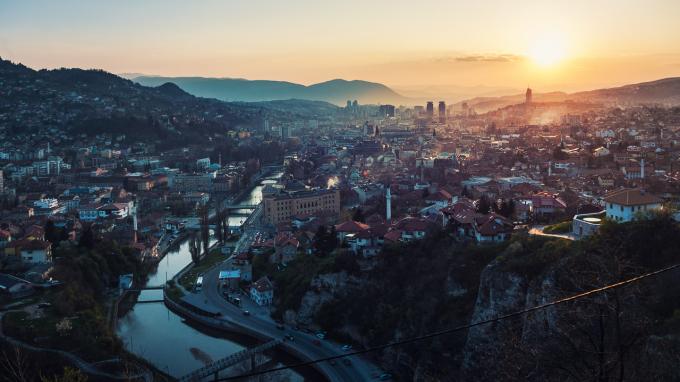
The Western Balkans: A Region in Transition

Sarajevo, the capital and largest city of Bosnia and Herzegovina. Photo by Michał Huniewicz.
In 2018, a new program team—Program Director Mia Vukojević and Program Associate Sonia Jagtiani—stepped up to guide development of the next phase of the Rockefeller Brothers Fund’s Western Balkans program. They took this opportunity to reflect on the Fund’s grantmaking in the region over the last four years and to assess the implications of rapidly changing social, political, cultural, and economic conditions in the Balkans. They traveled extensively in the region, met with dozens of RBF grantees and partners, and pored over countless reports, articles, and other documents to ensure the program’s strategies reflect the evolving context in the Western Balkans today.
The resulting program memo describes a region still in transition some 30 years after the end of communism and nearly 20 after the last of the Balkan wars ended. Ongoing corruption, organized crime, lack of government and leadership accountability, and “brain drain” affect both the daily lives of citizens and the “big picture” for the future of each country in the region. The goal of joining the European Union, once a main driver of reform efforts in the Balkans, no longer holds the allure it did a decade ago. Europe’s financial and refugee crises, and more recently Brexit, have had a direct impact on the Balkans and its EU prospects. While the Western Balkan countries are still going through accession processes, it has become evident that, in the near term, aspirations for peace, prosperity, and democracy must focus on the people and institutions of the Balkans.
Despite this sobering picture, civil society and independent media in the Western Balkans have shown resilience and determination. They continue to press for further democratization or at least to hold the line against new intrusions on freedoms and rights.
This elastic state of the region—growing and stretching here, receding and restricting there—signals the need for an increasingly responsive, flexible approach to the Fund’s grantmaking in the Western Balkans. Developments in Europe necessitate an embrace of democratic transition, durable peace, and sustainable development in the Balkans with or without formal EU integration. The unresolved conflicts that color all aspects of life there today also highlight the need for renewed attention to reconciliation and civic participation, and the growing constellation of civil society actors spanning causes from women’s rights to government transparency and renewable energy to cross-cultural exchange illustrate the opportunities for partnership and intersectional collaboration.
These modest shifts in our understanding are reflected in updated Western Balkans program guidelines, approved by the Rockefeller Brothers Fund board of trustees in March 2019. The revised text articulates our evolving understanding of the regional context and recalibrates the focus of our support for continued engagement with Europe. It also gives greater priority to democratic practice and peacebuilding as the cornerstones of the Fund’s vision for a thriving Western Balkans region and details refinements to our approach.